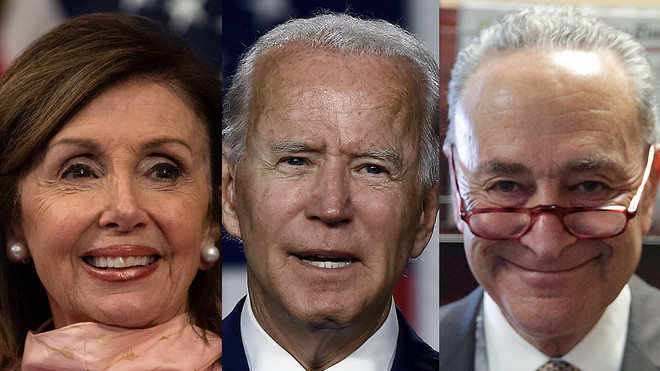Yesterday I got a call from the county health department telling me I could have a covid shot if that day at a mass-vaccination clinic, if I could be there in an hour. So I hustled at got the first dose of the Pfizer vaccine. Some advance notice would have been nice, but I’ll take what I can get. They gave me an appointment for the second dose in three weeks.
On to current events. The Senate worked through the night to pass a “budget blueprint” that will allow the covid relief bill to be passed through reconciliation. The vote was 50-50, with Vice President Kalama Harris breaking the tie at five-something a.m. As I understand it, the blueprint will be used to write the Senate version of the bill.
Li Zhou and Ella Nilsen at Vox explain the next steps. There’s still a lot that needs to be done before the bill becomes law. Dems are aiming to wrap it all up by March 14, when current enhanced unemployment benefits expire.
The bad news is that the provision for raising the minimum wage to $15 an hour was killed in the blueprint, probably to placate Joe Manchin. I feared that would happen. NY Times:
Proponents of raising the wage believe it can still be included in the final plan, forcing a tough vote for Democrats opposed to the increase but who won’t want to vote against the entire stimulus package.
“We need to end the crisis of starvation wages in Iowa and around the United States,” Mr. Sanders said.
He added that he planned to try to get the phased-in wage increase included in the reconciliation bill, which can be approved on a simple majority vote, circumventing a filibuster which requires 60 votes to overcome. But it is not clear whether the effort will succeed given the strict rules of the process, which mandate that any policy changes directly affect federal revenues.
The increase won’t pass in this Senate outside of reconciliation unless they kill the filibuster. Note that a considerable number of workers in West Virginia earn at or below the minimum wage, and that was before the pandemic. West Virginians would have benefited, big time. Way to go, Sen. Manchin.
However, other than the minimum wage provision, I don’t believe any serious damage has been done to the Biden Administration proposal.
Naturally, Republicans are outraged that Democrats would stoop so low as to pass all this stuff through reconciliation. Note that Republicans’ failed effort to kill Obamacare and successful passage of Trump’s tax cuts used reconciliation.
In the early morning hours on Friday, Senate Democrats passed a measure laying the groundwork to move President Biden’s big economic rescue package via the reconciliation process, by a simple majority. Republicans are already thundering with outrage.
The move does indeed pose a serious challenge to Republicans. But it’s one that runs deeper than merely moving toward passing this one package without them. It also suggests a reset in dealing with GOP bad-faith tactics across the board — and even the beginnings of a response to the Donald Trump era and the ideology loosely described as “Trumpism.” …
… Sen. Mitch McConnell (R-Ky.) is already denouncing this move. The minority leader railed that Democrats have “set the table to ram through their $1.9 trillion rough draft,” adding: “notwithstanding all the talk about bipartisan unity, Democrats are plowing ahead.”
Get used to it, Mitch. Sargent reminds us that McConnell’s use of filibuster rules effectively destroyed bipartisanship in the Senate for several years. And here is the critical point, for Democrats:
Senior Democrats have begun to articulate the idea that the true way to revitalize faith in government — and in democracy — is by successfully delivering on big-ticket items. Achieving bipartisan cooperation for its own sake will do far less to address deep civic division and disillusionment than robust and effective action on behalf of the common good will.
Exactly. And I also want to quote something Sargent wrote last week:
As political scientist Stephen Skowronek recently told Michelle Goldberg: “The old Reagan formulas have lost their purchase, there is new urgency in the moment, and the president has an insurgent left at his back.”
The skunk at the picnic is Larry Summers, the centrist economist who was dumped from Biden’s economic team last year. Summers penned an op ed at WaPo saying that Biden is ignoring too many risks. However, President Biden doesn’t care.

